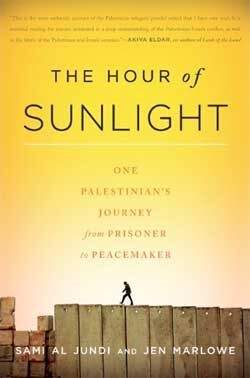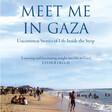The Electronic Intifada 30 March 2011

In her introduction, co-author Jen Marlowe — herself for a time a worker at the Peace Center — writes of Al Jundi’s “unshakable belief that … [Israelis and Palestinians] would benefit from the presence of and relationship with the other” and his “ultimate dream … for his children, together with the children of his many Israeli friends, to be able to play together in the sunlight …” (xvi-xvii).
The first two-thirds of the book constitute a straight autobiography, detailing Al Jundi’s birth in old Jerusalem in 1961, his experience of the June 1967 War (35), his adolescent gravitation towards armed militancy culminating in his arrest for bomb-making in 1980 (93), and his ten years in Israeli prisons during which he acquired organizing skills in various prisoner committees and read voraciously, being particularly impressed by Gandhi and his peaceful “tactics against the British occupation of India” (153).
After his release he encounters Seeds of Peace, founded by the Jewish-American journalist John Wallach in 1993, which organizes summer camps in Maine for Arab and Israeli teenagers (231-2). Al Jundi becomes the organization’s coordinator in the Middle East, responsible among other things, in Marlowe’s words, for “dispatching his brothers all over the country to bring Israeli and Palestinian youth to the Center to work together on art, drama and photography projects” (xvi).
Problematically, the Seeds of Peace Center for Coexistence is opened in French Hill, an illegal Jewish settlement in occupied East Jerusalem, here euphemistically described as a “mixed neighborhood …” (250). Equally problematically, the “Israeli Seeds” (as they are referred to throughout, calling to mind the “Pod People” in the classic science-fiction film The Invasion of the Body-Snatchers) graduate from the center to serve in the same army that is deployed to repress and brutalize Palestinians. “It was not our role to discourage military service,” writes Al Jundi (295), although some principled Israeli Seeds become conscientious objectors. His own family warns him that Seeds of Peace are “using” him, and “serving a Zionist agenda” (243-4).
With the ascendancy of Israeli arch-hawk Ariel Sharon and the start of the second Palestinian intifada in September 2000, things deteriorate rapidly. Forbidden from participating in Palestinian demonstrations against Israeli brutality, he can only sit in his office feeling “self-disgust every time I picked up the phone to find out what was happening” (261). When Israeli police murder Aseel Asleh, a Palestinian Seed with Israeli citizenship, John Wallach refuses to issue a statement of condemnation, stating that “Seeds of Peace as an organization had to remain apolitical” (270).
Yet “the Israeli Ministry of Education prepared the kids as if they were entering a battle that they had to win … ‘If they bring up Jerusalem,’ certain delegation leaders coached them, ‘don’t ever give in. You can never give up Jerusalem!’” (290). Clearly the avoidance of “politics” is one-sided.
Describing himself as “a new sheriff in town,” African-American Tim Wilson takes over as director. Citing the need to “run with the big dogs,” he fires Jen Marlowe (308), decrees that “bringing Israelis and Palestinians together” is “out” and introduces “service learning” — “Israeli Seeds would do community service in Israel, Palestinian Seeds in the West Bank and Gaza” (312).
By now, many readers will feel vicarious frustration on Al Jundi’s behalf, and wonder why he doesn’t simply find more productive employment elsewhere, particularly since he is no political innocent. Al Jundi writes “Claiming that Seeds of Peace was nonpolitical did not hold up. Conflict and its resolution are inherently political. [South African Archbishop and Nobel Peace Prize Winner] Desmond Tutu … once said ‘If you are neutral in situations of injustice, you have chosen the side of the oppressor.’” He recalls the warning of his brother Riyyad: “Seeds of Peace is a Zionist organization,” only to conclude “I shook those thoughts away … I knew what motivated us … It was … love for our kids, all our kids” (276).
This faith in the force of his own motivation, even while conceding the dubious nature of the Seeds of Peace enterprise, comes across as both quixotic and — it must be said — almost egotistical. Ignominiously, Al Jundi is at last ousted from his office by armed Israeli security guards. Nothing could be darker than his conclusion: “Ten years in prison had not damaged me as deeply as Seeds of Peace had” (328).
This leaves the reader to wonder, when is the eponymous “hour of sunlight”? Where, in this chronicle of failure and humiliation, is the “redemptive story” showing us “the path to a resolution” of the conflict? Did those who made these comments even read the book to the end?
Al Jundi’s “ultimate dream” for Palestinian and Israeli children “to play together in the sunlight” cannot be served by an organization like Seeds of Peace that, in reality, helps to perpetuate injustice by fostering the illusion that peace and reconciliation can be achieved without ending political oppression. Typical of its role was its meeting in Tel Aviv and Ramallah with American singer Macy Gray last February, when it served to whitewash Gray’s decision to spurn the cultural boycott called for by Palestinian civil society and cultural organizations by performing in Israel.
Perhaps, however, something has grown from these Seeds: the International Solidarity Movement, founded by former Seeds Huwaida Arraf and Adam Shapiro, which brings together Israelis, Palestinians and internationals “committed to resisting the Israeli occupation … using nonviolent, direct-action methods and principles” (International Solidarity Movement). Asked whether he wanted to work with them, Al Jundi replied “I did. I was proud of what they were doing. But to go in the direction they were heading would mean leaving Seeds of Peace” (275).
The Hour of Sunlight gives readers all the reasons why this good, idealistic human being should have taken precisely that step, and leaves them in the dark as to why he didn’t.
Raymond Deane is a composer and political activist.
Related Links




